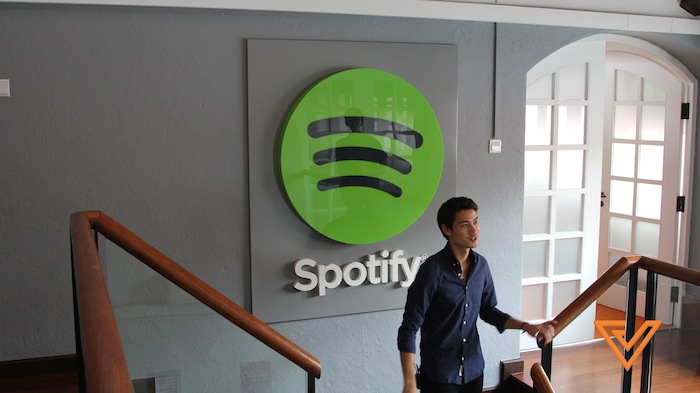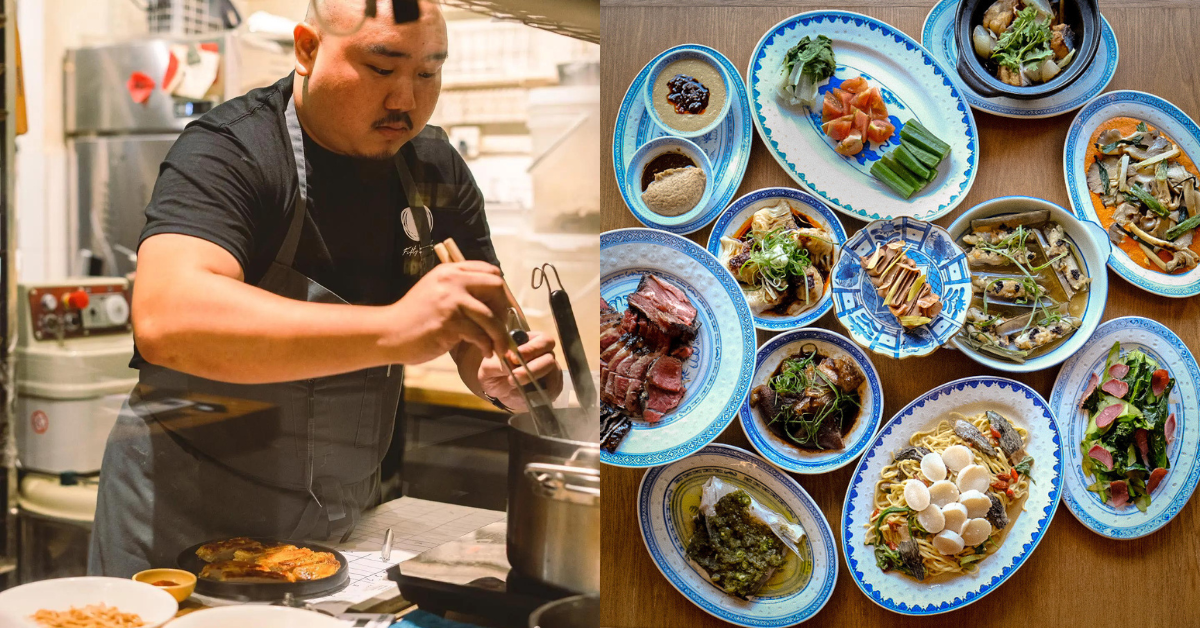Tucked away in a shophouse on Boat Quay, above a seafood restaurant lined with tanks of fish, is Spotify Asia’s regional office. If you look past the hustle and bustle of the very traditional seafood restaurant, and dark and dingy flight of stairs, you’ll see an office space flooded with natural light, desks stacked high with papers, and several of the Spotify team at their desks, separated from the world by thick sets of headphones.
The day I visited the office, there was a stage set up with a microphone and a familiar green backdrop, where famed musician and YouTuber David Choi would later croon to a group of fans and “industry friends” for the launch of Music Matters. Not a common occurrence, but one would suspect that the comfortable nook carved by the corridor to the pantry was made just for such occasions. The staff hardly seem disturbed by the sound checks and the presence of the American Internet celebrity.
Spotify is a name that has been the talk of the town. Since its launch in 2008, it’s conquered 58 markets in the quickest growth in the music industry since pre-Napster days. It’s been lauded as one of the main vehicles driving up digital sales, and champions for the fight against piracy by offering music lovers a low-cost option to listen to the music they want.
But at the same time, they’ve been criticised by music-creators for under-compensating small-time musicians. With the death of CDs, the pricing of music has been a constant source of debate, and thanks to celebrities like Taylor Swift, Spotify has found itself in the dead centre of the controversy. “Doing a Taylor Swift” is now seen as an act of defiance “against the man”, standing up for musician’s rights.
But since when has Spotify become the man?

The Monster Of A Spotify
I had a chance to speak to Chee Meng, Director of Label Relations in Spotify. His job, according to him, entails talking to all players in the music industry, placing him right smack in the middle of the conversation surrounding artist-platform relations. This issue has been in debate since Swift did her number on their global Public Relations team. Chee Meng was happy to clarify doubts that people had about Spotify’s artist-platform relations, and often elaborated that it was short-sighted to see Spotify as a mere streaming platform.
“Spotify is a hybrid platform if you think about it: you get revenue generation, of course, but it’s also a promotional platform, and that social element of it all ties up. And now that we have editorial content, the playlists are curated by human curators — that means local experts, market experts, genres, with the algorithms we have and the data insights we have — so we’re really curating all these editorial playlists and putting everything together so you get a hybrid platform. It’s a bit of iTunes, Amazon meets Facebook, Twitter meets BBC. It’s a mixed breed.”
When asked about Spotify’s work in Southeast Asia, Chee was excited to talk about the Philippines, and no wonder. With so many fresh faces in nascent music industries, the relationship between Spotify and Southeast Asia’s artistes is one of trust and reliance. Philippines, especially, is their second fastest growing market in the world, and its largest market in Southeast Asia.
At their first anniversary celebration earlier this year, Spotify celebrated a record-breaking 2.5 billion music streams from music fans across Luzon, Visayas and Mindanao — the highest number of streams garnered from any Asian market a year from launch. Currently, an insane 1 in 5 Filipinos on the Internet are using Spotify.
And according to Chee, the Filipino music industry is setting the bar for the ideal level of interaction with the music streaming service.
“We were in the Philippines celebrating our first year anniversary, and the Philippines is our second fastest growing market in the world. I spent some time hosting the artist workshop, so we have artists, handlers, managers, coming in to get a better understanding of what Spotify really is, and as we were walking out, we started getting approached by them like ‘hey, here’s a piece of exclusive content, what can we do?’.”
“I think the key is to get everyone to understand the proposition, where something that is quite traditional, meaning a one-off transaction purchase, to something which is of a lifetime revenue cycle. Lifetime value, which means that every month, as long as you engage your user, as long as you build a fanbase on Spotify, you will see their return on Spotify.”
Don’t Cross The Streams

But what of Swiftie’s accusation? According to a Time report released in 2014 — which came hot on the heels of the Taylor Swift fiasco — the top hit of the year was Calvin Harris’ Summer. It had a maximum payout of $1.7M, with 203 million streams. Katy Perry’s Dark Horse would get a $1.2M – 1.6M payout with 196 million streams, while Radioactive by Imagine Dragons would get around $690K – 970K with their 115 million streams. And that’s for the most-streamed songs on Spotify.
Charlie Lim’s single Knots, later also released with his double EP Time/Space, has about 50,000 plays to date. Linearly extrapolating that figure from Calvin Harris’ Summer’s stats would get you a figure of around $400.

Of course, that calculation doesn’t take into account the actual arrangement between artists and record labels — tackling home-bred talents like Charlie Lim and international sensations like Calvin Harris is ultimately playing two very different ballgames. But it does open your eyes to the struggles of local artists. In this digital age, we no longer live in the world where you walk into a CD store and buy a single for about S$5, or an album for S$20. Digital has set the new price for music, but when you’re starting from zero, there isn’t much to go on.
Spotify, now a key component in valuing music in the industry, is keen to build upon that, and has been offering diversity in revenue streams.
“When you look at revenue, it’s not one stream, it’s not just recording,” said Chee. “It’s live, it’s merch, there’s synchronisation, brand endorsements. So at the centre of that you can look at artists, you can explore the different revenue streams. If you purely look at their recording, that is one avenue. But if you take a step back and look at it from a holistic approach, the question is how do we unlock the full value of a Spotify user.”
Spotify Vs And The World

While the struggles of small-time musicians are out there, Spotify is still steadily growing greater and faster. When Tidal — a competitor whose main goal was to fairly compensate artists with a significantly higher price point — entered the Southeast Asian market, Vulcan Post approached Spotify for a statement. Then, they avoided commenting on their new competitors, especially with Apple Music releasing a mere few months after. But with an obvious lead at 15 million paying users, they’re now revelling in their success.
And each time a new player comes into this space to take on the big lime-green giant, Spotify’s users go up.
“We must be doing something right for similar service to come in,” says Chee. “Competition is always good, keeps everyone on their toes. And it just speeds up the whole process — educating everyone. The verdict is out there for the users to decide.”
But is the game fair? Speaking to Singapore-based musicians, the consensus across the board seems to be that Spotify isn’t going to be a viable source of income, and shouldn’t be considered as such. But the fact remains that it is a powerful marketing tool that can’t be ignored. With Spotify, the chances of becoming the next Hosier or Lorde is much higher than putting your CDs out for sale, and your chances of having a full house at your next gig goes up a little bit more.
“I think Ed Sheeran put it very well: Spotify allows him to tour the rest of the world,” said Chee. “He has two billion streams today. Without a service like Spotify that allows him to build that fanbase globally, that wouldn’t be possible.”
Or as one local artist puts it: “We’re not going to make any money regardless, so we might as well use it to get the word out.”












